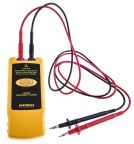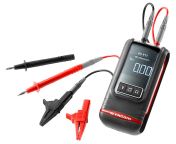Continuity Testers
other equipment. By investing in a reliable continuity tester, electricians, technicians, and DIY enthusiasts can enhance safety, minimise downtime, and deliver efficient electrical solutions in various industries.A Continuity Tester can sometimes be referred to as an "Electrical Tester", "Voltage Continuity Tester" or a "Circuit Tester".
How do Continuity Testers work?
The test equipment holds an electrical current indicator, which sits between the two test leads and probes. Whilst performing a test, if a circuit is established and a current or voltage is found then the indicator will be activated. This indicator may be in the form a light or buzzer, alternatively there are audible Continuity Checkers that will omit a beeping noise if power or a current is found during.
What are Continuity Testers for?
A Continuity checker is used to perform a continuity test on apparatus, to determine if a connection has been made correctly or if one is apparent between two points. This tester also helps with the indication and detection of two points that are connected, that possibly shouldn't be.
Applications for Continuity Testers include:
- Electrical Troubleshooting - identifying faulty connections, open circuits, or broken wires in electrical systems
- Circuit Board Testing - by checking the continuity of circuit traces and component leads, testers help locate shorts, faulty solder joints, or damaged components
- Automotive Electrical Systems - for diagnosing electrical problems in vehicles
- Appliance Repair - by verifying the integrity of electrical connections within devices including identifying faulty switches, damaged power cords, or broken heating elements
Continuity testers are indispensable tools for anyone working with electrical systems and at RS we have a variety of Continuity Testers, brought to you from leading brands such as Chauvin Arnoux, Martindale and of course our trusted own brand RS PRO.


